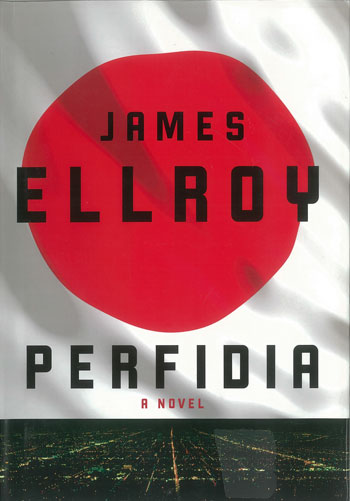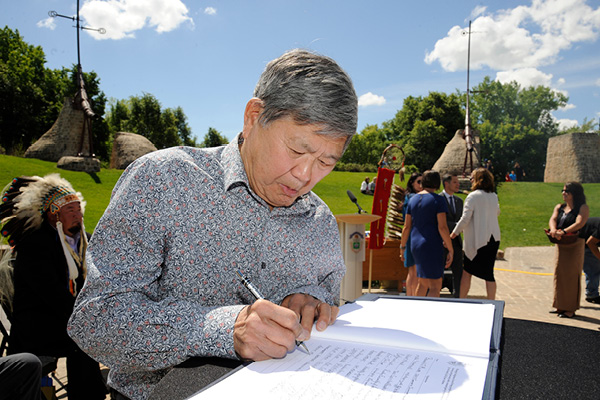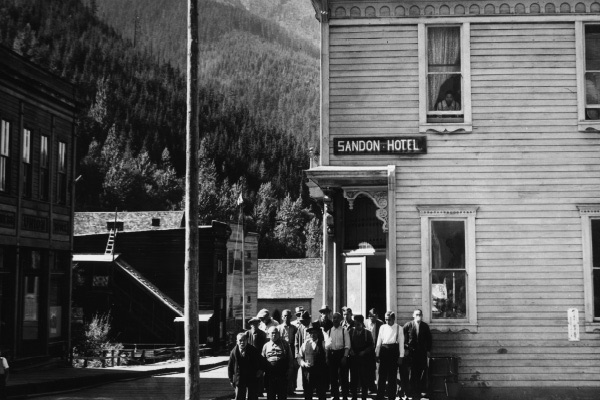 PERFIDIA
PERFIDIA
by James Ellroy
Alfred A. Knopf, 692 pages, 2014
by David Fujino
It’s December 6, 1941 — America is on the brink of World War II — and among the police and public service denizens of L.A. (Los Angeles) the coming of the Japanese internment and its inevitable land grabs already dominate the general mental chatter.
Dominant Asian populations are routinely referred to in abrasive and popular racist language as Japs and Chinks. The LAPD (Los Angeles Police Department) heedlessly follows their own code of conduct while ostensibly observing the law. The lives and daily exploits of the LAPD are fuelled by murder, booze, criminal activity, rapid chain smoking, amphetamines and opium. Concurrently, saturnalian encounters abound and the Hollywood set embroiders L.A. life with its passing-through-luminaries like the actress Bette Davis, conductor/composer Leonard Bernstein, and the singer and political lightning rod, Paul Robeson.
Such is the feverish world of American novelist James Ellroy’s PERFIDIA which covers 23 days from December 6, 1941 to December 29, 1941 — the paranoid hectic days before, during, and after the Japanese attack on Pearl Harbor. The country is staring into the abyss and is simultaneously poised high, quote, on “the precipice of America’s ascendance.”
Conceived as the first book in the Second L.A. Quartet, PERFIDIA is an ambitious fictional history of LA during World War II. In this proposed Second L.A. Quartet, Ellroy takes characters from his original L.A. Quartet and trilogy (set between 1946 and 1972) and portrays them in their much younger years.
PERFIDIA’s sprawling and self-indulgent narrative typically mixes real-life and fictional characters — for example, First Lady Eleanor Roosevelt, Joseph Kennedy (the patriarch of the Kennedy political dynasty), and J. Edgar Hoover of the F.B.I., are among this book’s dramatis personae, along with created characters like the closet gay chemist Dr. Ishida and his mother, Mariko. It can be categorically stated that no one, no one in this book is innocent, law-abiding, nor angelic.
In Ellroy’s striking short hand prose, we are introduced in Chapter One to the brilliant LAPD chemist, Hideo Ashida, who is on the job after a robbery: “Los Angeles — Saturday, December 6, 1941, 9:08 am. There — Whalen’s Drugstore, 6th and Spring streets. The site of four recent felonies. 211 PC — Armed Robbery.” Notice Ellroy’s especially active and audacious staccato prose.
Then, one day, the shocking death of the Watanabe family sets off certain segments of the LAPD on high alert. This central incident, around which the plot largely pivots, is the gory death — is it a murder? or ritual suicide, seppuku? — of the well-off Watanabe family (father Ryoshi, Aya the mother, daughter Nancy, son Johnny) who live in Highland Park and not Little Tokyo.
The four main characters in this novel are Hideo Ashida, a bilingual Nisei LAPD (Los Angeles Police Department) chemist; Kay Lake, a dilettantish young adventuress and keeper of a scandalous journal; real-life Captain William H. Parker of the LAPD; and Sargeant Dudley Smith, an Irish-born (Dublin) and L.A.-raised ex-gun runner, who are brought together during these 23 days as lovers, rivals, partners, and history’s pawns, only to be torn apart and finally left exposed under the unforgiving, bleak light of reality.
At this point, it seems entirely appropriate to quote the epigraph to this novel:
Envy thou not the oppressor,
And choose none of his ways.
— Proverbs 3:31
And further consider this: While Ishida hides crucial evidence found in the Watanabe murder investigation, he’s also promised a delayed internment from Dudley Smith, and upon release, will receive preferential treatment for himself and his mother. And after Kay Lake’s vividly chronicled diary entries of her intimate actions and interactions with Ishida, Captain William Parker, Sargeant Dudley Smith, and the leftist lesbian documentary filmmakers whose films condemn the rise of the Nazi and Axis powers, Kay Lake herself is never investigated and goes scot free, for these are heady times and normal rules don’t apply.
The reader can see why Ellroy has been described as “the lap dog of the LAPD”. Ellroy practically rhapsodizes over the free-wheeling, cruelly murderous impulses of his characters who no longer operate in a rational world, and in his scandal sheet allegations about Eleanor Roosevelt’s sexuality and her female comrade film makers, he exhibits considerable prurience, for Ellroy is, above all else, a highly personal novelist.
PERFIDIA is a true rampage of language. All the niceties of most written language are ignored: in comparison, Mickey Spillane reads like a fine belle lettrist, and, like it or not, enjoy it or not, James Ellroy’s latest novel depicts L.A. and its citizens, including the Japanese Americans, as never before, and that’s oddly refreshing — and finally, to give readers a clear sense of this novel’s intriguing ‘tone’, I offer the following dictionary definition: Perfidy = treachery, disloyalty, deceit, duplicity, betrayal, lying.
•



